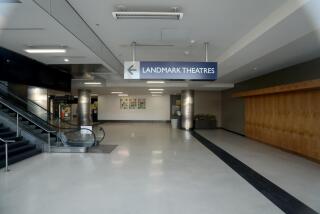Job-Training Center in Ramona Gardens Opens : Social services: The facility is the first of five being set up in city housing projects. It offers counseling, tutoring, child care and job training and placement.
- Share via
Days before a contingent of city, school and private industry officials showed up at the opening of a new counseling and job-training center in the Ramona Gardens housing project on Tuesday, the desperate need for help was already being made dramatically clear.
About 50 yards from the door to the recently renovated center in East Los Angeles, residents found the body of a man who had been brutally murdered in an apparent pay-back for a drug deal gone sour, police said.
Last Thursday, when the body was discovered, “people kept coming up to me and asking if I was going to be too scared to work here in the projects,” said Emma Hernandez, the center’s director. “I told them, ‘No, I’ve experienced the smell of death before. That shouldn’t discourage us. It only shows that we have our work cut out ahead of us.’ ”
Police said they are still searching for clues in the drug-related death of Daniel Valenzuela, 33, whose body was found near the center.
Hopefully, Hernandez said, the new center will help end the cycle of violence and drug abuse that has exacted a heavy toll on the residents of this low-income housing project.
The Ramona Gardens Community Service Center, a joint venture between the Community Development Department and the Los Angeles Housing Authority, is the first of five centers being set up in city housing projects offering residents a variety of services, such as counseling, tutoring, child care and job training and placement.
“The feeling is that we could do a better job of helping people at risk by bringing the services to the people in the projects,” said Parker C. Anderson, general manager of the city’s Community Development Department.
The center will also provide transportation if a resident needs services it does not provide, such as physical and psychological testing, emergency dental care and eye examinations.
In addition to Ramona Gardens, the city plans to open centers in four other housing projects: Nickerson Gardens, where 67% of the residents are under 18, San Fernando Valley Gardens in Pacoima, Rancho San Pedro in Wilmington and Mar Vista Gardens in West Los Angeles.
City Councilman Richard Alatorre, whose 14th District includes Ramona Gardens, said the program will provide residents with easier access to city services.
“Hopefully, we’ll stop treating these kids as just sad statistics, and begin to treat them as human beings with real needs,” he said. “The people in Ramona Gardens are no different from the people in Beverly Hills. They want to live decent lives and to help their children to have a better chance than they did.”
Alatorre joined Thomas V. McKernan Jr., president of Los Angeles’ Private Industry Council, in asking that corporations donate money to support the project, which already has received a $1.3-million grant from the federal Job Training Partnership Act.
“This is the best thing that could happen to us,” said Nickie Martinez, 62, who has lived in the Ramona Gardens housing project for 34 years. “We have many needs here and we can use all the help we can get.”
“This is like a small town--a small city--and we need more services here to help people survive,” said Salvador Franco, a 22-year resident of the complex.
On Tuesday, dozens of city and school officials crowded into the Ramona Gardens auditorium for a program that included speeches, mariachi band music, Aztec dancing and a tour of the new center.
On a nearby corner, it was business as usual for a small group of men who were unaware of the festivities as they drank beer from cans wrapped in paper bags and talked about their plight.
“They can build all the centers they want, but nothing is going to happen here to change unless they get us some jobs and do something about the drugs here,” said a man who said he has lived in the projects all his life and identified himself only as Johnny, 34. “If they don’t do something soon, there’s only going to be more deaths.”
More to Read
Sign up for Essential California
The most important California stories and recommendations in your inbox every morning.
You may occasionally receive promotional content from the Los Angeles Times.













